大学英语基础模块第2版第三册unit7-2
- 格式:doc
- 大小:67.50 KB
- 文档页数:7
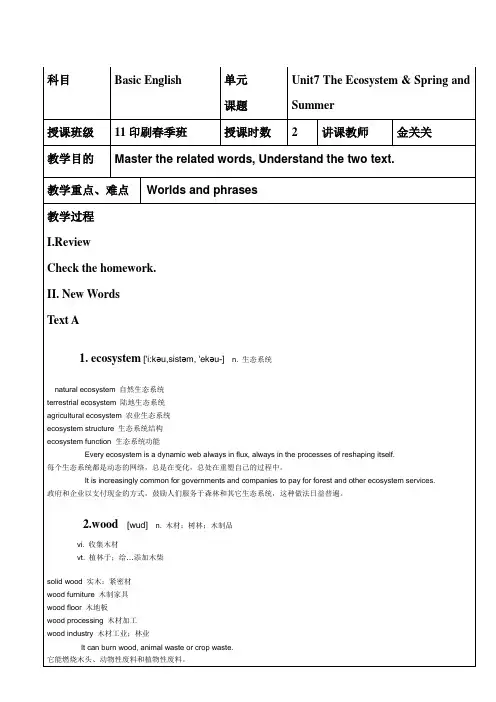
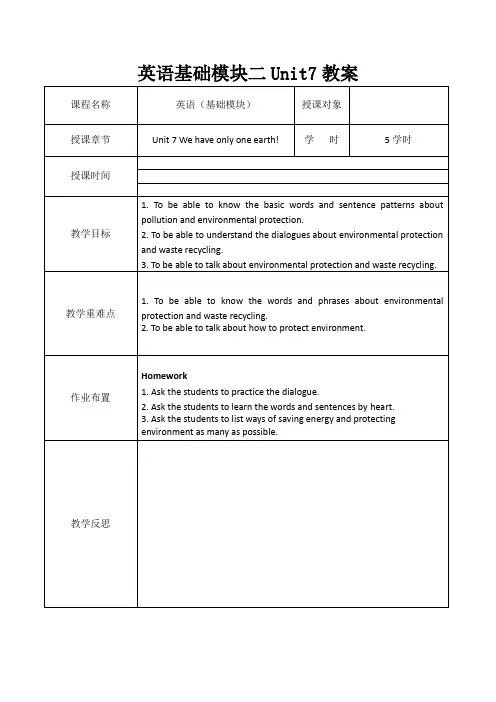
英语基础模块二Unit7教案S1: Happy new year, S2! Here’s a small gift for you.S2: Wow! What a beautiful toy rabbit! Is this a DIY gift?S1: Yes. I made it with an old glove.S2: It’s so charming/cute. And, it’s a great example of recycling, too.S1: I hope you like it.S2: Certainly. I like it very much. It’s really special. Thank you!Step 2 Listening & Speaking practice (2)H e Ying: Oh dear, look at the sky. It’s so dusty.Li Dong: How terrible! Another sandstorm is coming!He Ying: Yeah, it makes it hard for people to breathe.Li Dong: And the dust makes me feel very sick.He Ying: Me too. And look, the traffic is moving so slowly.Li Dong: Sandstorms may cause many traffic problems.He Ying: We must do something about it.Li Dong: Right. We should plant more trees and grasses.Listen again and fill. 7. Ask the students to listen to the dialogue again. And then ask them to make dialogues with the given words and pictures in Activity ③in pairs.1. Ask the students to look at the picture on Page 68 and guess what happened.2. Ask the students to listen to the dialogue of Activity ④and practice the dialogue after tape.3. Ask the students to repeat the dialogue and try translating it into Chinese.4. Present the two sentences and explain the different meanings:It makes it hard for people tobreathe.The dust makes me feel very sick.5. Listen and fill in the form in Activity ⑤.6. Ask the students to discuss other ways of preventing sandstorms. And make new dialogues about other kinds of pollution.1. Ask the students to read the ways of energy-saving and environment-protecting in Activity ①on Page 69, and pay attention to the words above.Step3:Reading Practice (1)I flush the toilet with grey water. And when I go shopping, I take a cloth bag or a basket.I ride my bike to school.I do paper folding crafts with old newspapers.When printing files, I use both sides of the paper.I use energy-saving light bulbs.Discuss and list.1. Turn off the lights when you leave the room.2.3.Key sentences:I flush the toilet with grey water.When printing files, I use both sides of the paper.Step4 Reading Practice (2)How can we fight against pollution at school?•Collect all waste paper and litter.•Never spit in public areas.•Take care of the plants on campus.•Volunteer to clean up the school.•Create a school website about environmental protection.•Put up educational posters around the school.•Put all rubbish in dustbins.•Organise a green club.Read and match. 2. Ask the students to listen to the tape, and answer the questions above.3. Play the tape again and ask the students to read after the tape. Explain the meanings of these sentences to the students.4. Ask the students to complete Activity ②.1. Ask the students to read the ways of fighting against pollution at school on Page 70, and learn the key words:2. Play the tape. Answer :How many measures does the passage mention? Do you spit in public areas?Do you have a green club in your school or class?3. Ask the students to listen to the tape again. Ask several students to state the ways of environment protecting in Chinese.4. Ask the students to look at the signs and pictures in Activity ④on Page 70, and then match them.1. Read the passage of Activity⑤, and answer the questions:How many categories can waste be classified into? What does recyclable rubbish include?Step 5 Reading Practice (3)Read and learn.Sorting refuse is a good way to save resources. In general, waste can be classified into four categories—recyclable rubbish, kitchen waste, harmful rubbish and other waste. Recyclable rubbish includes waste paper, plastic, glass, metal and cloth items. Kitchen waste usually includes leftovers, bones, vegetable roots, leaves, peel, etc. Harmful rubbish includes used batteries, broken lamps, expired drugs, etc. Other waste usually consists of things that are difficult to recycle, such as bricks, toilet paper, tissues, etc.Read again and classify【课堂小结】Step 6 Consolidation and summaryI. Review the words in this lesson.II. Pick up some sentences from this unit and put them on the slide. Ask the students to explain and translate them.III. Encourage the students to save energy and protect environment in daily life.【板书设计】What does kitchen waste usually include?What does harmful rubbish include?2. Present the new words:sort refuse resource in general classify waste category3. Ask the students to listen to the tape and pay attention to the words.4. Play the tape again. Listen and try to classify the four kinds of rubbish in Activity ⑤.5. Read the passage again, and complete the exercise in Activity ⑥.6. Check the answers and learn the words together.。

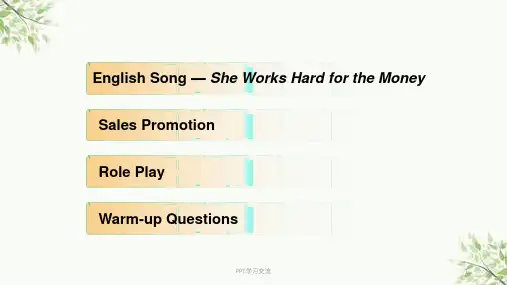
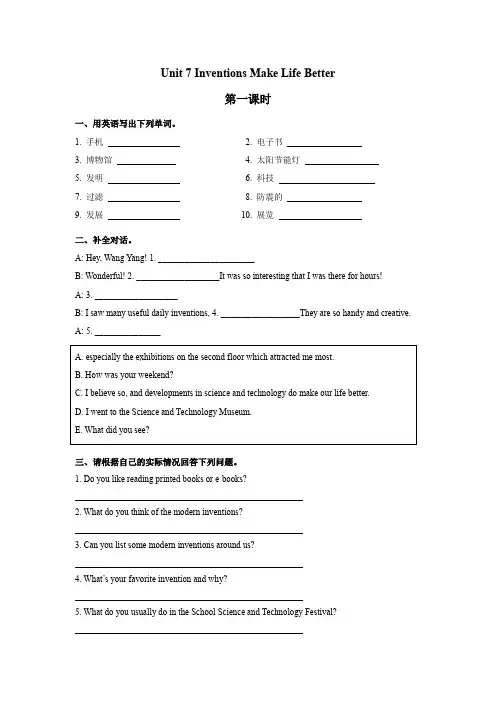
Unit 7 Inventions Make Life Better第一课时一、用英语写出下列单词。
1. 手机2. 电子书3. 博物馆4. 太阳节能灯5. 发明6. 科技7. 过滤8. 防震的9. 发展10. 展览二、补全对话。
A: Hey, Wang Yang! 1. ______________________B: Wonderful! 2. ___________________It was so interesting that I was there for hours!A: 3. ___________________B: I saw many useful daily inventions, 4. __________________They are so handy and creative. A: 5. _______________三、请根据自己的实际情况回答下列问题。
1. Do you like reading printed books or e-books?2. What do you think of the modern inventions?3. Can you list some modern inventions around us?4. What’s your favorite invention and why?5. What do you usually do in the School Science and Technology Festival?四、连词成句。
1. prefer, use, phone, instead, to, I, mobile, of, telephone, the___________________________________________________________________________ 2. China, paper-making, of, is, the, inventions, one, greatest, ancient, in___________________________________________________________________________ 3. from, inventions, people’s, so, come, daily, many, life___________________________________________________________________________ 4. ideas, are, inventions, about, new, to, share, students, invited___________________________________________________________________________ 5. who, blind, useful, people, is, really, for, it, the, are___________________________________________________________________________五、成长必修课。
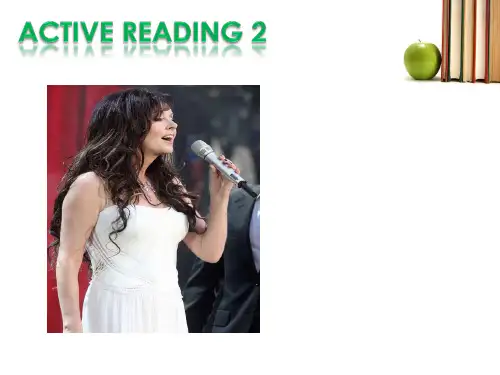
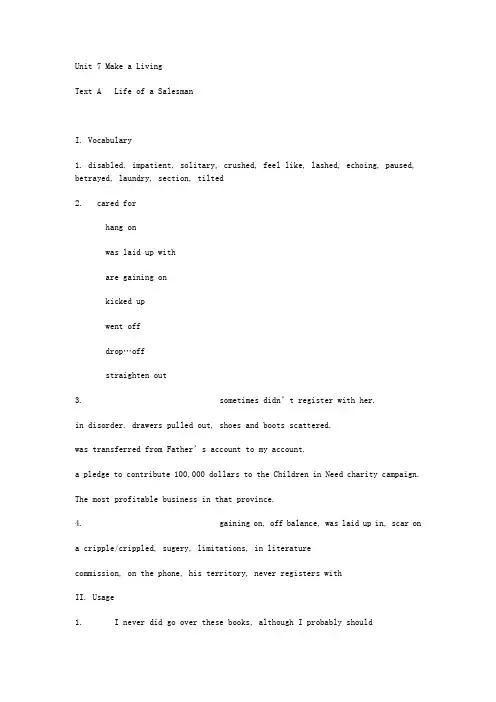
Unit 7 Make a LivingText A Life of a SalesmanI. Vocabulary1. disabled, impatient, solitary, crushed, feel like, lashed, echoing, paused, betrayed, laundry, section, tilted2. cared forhang onwas laid up withare gaining onkicked upwent offdrop…offstraighten out3. sometimes didn’t register with her.in disorder, drawers pulled out, shoes and boots scattered.was transferred from Father’s account to my account.a pledge to contribute 100,000 dollars to the Children in Need charity campaign.The most profitable business in that province.4. gaining on, off balance, was laid up in, scar ona cripple/crippled, sugery, limitations, in literaturecommission, on the phone, his territory, never registers withII. Usage1. I never did go over these books, although I probably shouldhave.2. I know this is a personal question. You don’t have to answer me if you don’t want to.3. I think this topic should have attracted far more attention from philosopher than it has.4. “I think you’re right.” ---“I’m sure I am.”5. “He thought that the comdition was hereditary in his case.”---“well, it might be.”6. “Sugar?”---“No. Maybe next time.”7. The house is only a building. It is a place to live, nothing more.8. DIANE: You didn’t! Tell me you didn’t!FATHER: Oh, yes. Anything for my children.III. Word Familybored, boredom, bored, boringly, boringencouraged, encouragingly, encouraging, encouragementfrozen, freeze, freezing, freezer, freezeComprehensive ExercisesI. Clozeoff, feet, signature, commission, on the phone, laid up, surgery, territory, disorder, applying for, dignity, didn’t, read, come, money, because, earning, doing, own, Obviously, valueII. Translation1. Translate the sentences into English, using the words or phrases in brackets.1) I grew terribly scared when I heard sound of footsteps echoing round the hallway at midnight yesterday.2) The name-brand sports shoes are guaranteed for 12 months.3) Snowstorms threw communications and transportation into disorder.4) I’ve been suffering a lot of stress from work altely. I feel like taking a vacation at the seaside.5)Living in an apartment is all right, but it has its limitations---for example, you don’t have your own garden.2. Translate the passage into English, using the words or phrases given below.Tom was born a cripple, with one of his lower limbs useless. Early in his childhood, he learned that unless he so exerted himself as to rise above his limitations, he could not earn a living, and unless he succeeded in making a living on his own, he could not win/gain the respect of others. That was the price he had to pay for his dignity as a human being.Tom applied for numerous jobs, only to be turned down, before he finally got one as a delivery boy for a Pizza Hut. He then worked as a sales representative for a sportwear company in a territory no one else would want. Today he owns a fairly profitable retail shop in his hometown, and hires several people to work for him.。
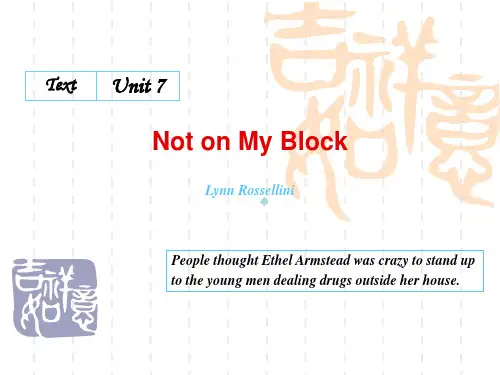
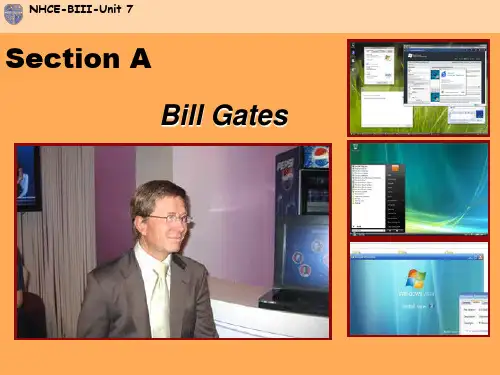
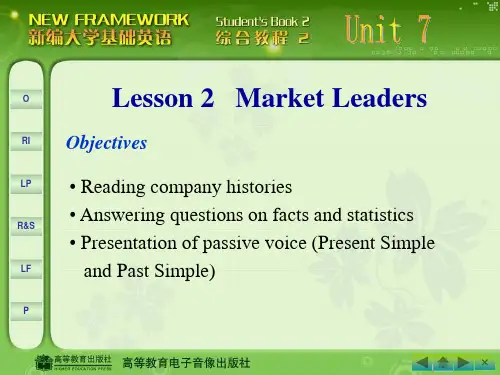
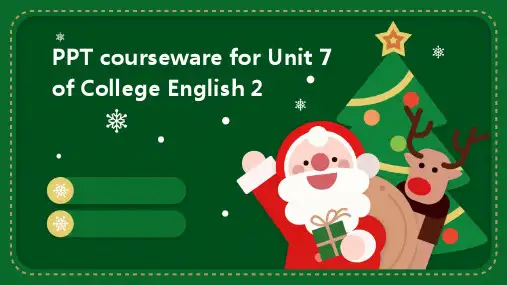
Unit-7Words for describing country landscapevegetation / plants—grass, trees,bushes,undergrowthgrassland / meadow (with flowers) / pasture-- a stretch of wild open land used for cattle to feed onLawn– a piece of flat ground, esp. next to a house, covered with closely cut grass waterway—river, stream, brook (small stream), estuarybody of water—pond, river, lake, sea, ocean, bay, lagoon,the wilderness,cultivated land cultivated land —corn fields, rice paddy, cotton fieldsupland: --plateau, mountains, cliffs, crags, slopes, hillslowland—valley, plain, grasslandseaside—beach, coastWords and expressions[1] be / feel at home—be /feel comfortable[2] commodious homestead—spacious house with surrounding land; farm[3] tickle an occasional trout—occasionally, catch a trout with one’s hands[4] permit of …–allow… as possible[5] homely occupations—domestic / family trades[6] weed-clogged—blocked by weeds[7] in the most subtle and sensuous way—in the most delicate and pleasurable way[8] year in, year out—regularly each year, without ever changing[9] haunt n. a place one often visitsif only:1)used to express a wish with reference to present or future time;2)2) used to express a wish that past events had been differente.g.1.If only I were rich. 但愿我很富有。
英语基础模块2知识清单(共14页)--本页仅作为文档封面,使用时请直接删除即可----内页可以根据需求调整合适字体及大小--英语基础模块2知识清单Unit laughed into tears.一、重点短语the zoo 去动物园 apples 摘苹果 the mountains 爬山the beach 在沙滩上 great fun 玩得高兴 swimming 去游泳oneself 玩得高兴 to do sth 志愿做… a very big snowman堆雪人and dry 又干又冷 with housework at home在家帮忙做家务hesitation毫不犹豫 ill 生病 to go 志愿做。
an hour 半个小时 into tears 笑出眼泪him a shopping list 给他列购物清单 in bed 躺在床上day before yesterday 前天 online 网上聊天amusing story 一个有趣的故事 the chores 做家务 23. read aloud 大声朗读二、重点句型1How was your vacation你的假期怎么样was the weather like in……的天气怎么样went sailing last summer. 去年夏天他们乘帆远航去了prefer walking to cycling 比起骑自行车,我更喜欢走路spent all day in watching football .杰克花费一整天时间看足球did you do last weekend 上周末你做了什么?一般过去式(I)Unit2. I saw a terrible movie一、重点短语2he Internet 上网 computer games 玩电脑游戏 a movie 看电影to the gym 去体育馆 to a club 去俱乐部through the best part 电影院睡觉.错过电影最精彩的部分movie called…一部名叫…的电影 special 没什么特别的way of relaxing 一种放松的方式 else 还有其他什么事吗the time 一直 is a waste of time to do…干……是在浪费时间her spare time 在他空闲时间 museum 当地博物馆a snowman 堆雪人 a film 看电影opera 肥皂剧 program 电视节目 great 听起来不错二、重点句子did you do last weekend?你上周末做了什么?do you think of the movie 你认为这部电影怎么样story is so moving 故事很感人you do anything special你做什么特别的事情了吗type of movie did you like in the past?你过去喜欢看什么类型的电影preferred horror films at the time 呢个时候我喜欢看恐怖电影of the most famous rock bands in the world 世界上最著名的摇滚乐队之一 and hours sitting before a computer 我花了很长时间坐在电脑前Mary see a great movie last Saturday?他上周六去看电影了吗?do you like……怎么样?about doing sth干……怎么样一般过去式(II)Unit3. Have you ever done a part time job?3一、重点短语confident of…对……有信心 confidence in …对……有信心at sports 擅长体育 with directions 方向感比较好with your hands 动手能力强 interview 工作面试the test 通过测试 English 英语很流利a computer major student 作为一个计算机专业的学生communication skills 良好的交际能力job 兼职工作 interview 工作面试good communication skills 有良好的交际能力experience 工作经历 soon as possible 尽快a part-time job 做兼职工作 to work under pressure 在压力之下工作的能力 English 口语 least 至少 for 寻找more information 更多的信息 soon as possible 尽快 23..don’t mind working …不介意做…… for 申请you are interested 如果你感兴趣的话 to another city 飞到其他城市 of a big company 一家大公司的经理teacher 幼儿园老师 school teacher 小学老师hunting 找工作 30..as soon as possible 尽快二、重点句子are your strong points 你的强项/优势是什么2. Look for a salesperson 找一个销售的工作for the position 申请职位 4. Graduated form …毕业于……have done my homework.我必须要做作业you think you are qualified this job 你认为你适合这个工作吗?you please introduce yourself 你能介绍一下自己吗you have any experience in this field 你有这方面的工作经历吗you like working with an exciting new company 你想在这家新公司工作吗10 Are you looking for a part-time job 你在找兼职工作吗?you like something to eat 你想要点吃的东西吗4Unit4. I’ve tried all the means of transportation.一、重点短语the subway 乘地铁。
新编大学英语第二版第三册第七单元课文翻译浙江大学外语教学与研究出版社新生之旅25年前我感觉自己成了废物。
尽管那时我只有23岁,但我的生活似乎到了尽头。
我的未来看起来好似荒漠,就像回顾过去时,看到的是一片空虚。
我感到迷茫,毫无选择余地,毫无希望可言。
我当时被困在两件事中:做着一份我憎恨的工作,并与一个我并不爱的女人订有婚约。
当初,两个承诺都好像是不错的主意,但是我想吸引我的只是成为一个成功的已婚商人的幻想,而远非现实。
我决定进修一门课程,仅仅为了好玩而已。
这刚好是一门咨询入门课程,需要个人参与到集体中去。
(这门课程)要求我们对生活中要进行的变动做出公开承诺。
出于一时冲动,我宣布在下次上课之前,我会辞去工作并解除婚约。
几天后,我失业了,也解除了婚约,为获得的自由而兴奋,但又因为不知道下一步做什么而惶恐。
我需要某种从旧生活到新生活的转变,一种有助于我从一种人转型为另一种人的(必不可少的)程序。
于是我做了一件与我前面的行为同样冲动的事情:我预定了到阿鲁巴岛为期一周的旅行。
不管别人会有什么样的想法,但是我并不是在逃避现实,而是在追求未来。
我想有一个彻底的决裂,而且我知道我需要离开自己熟悉的环境,摆脱原来的影响,以便考虑清楚自己将何去何从。
在阿鲁巴小岛上的房间里一安顿下来,我就开始了自我改变的进程。
其实只要没人能打电话找到我没让我能平静安宁地思考我想做的事,我到哪里去都可以。
上午我在海滩上长时间地散步,下午则坐在我喜爱的树下看书,听录音磁带。
最重要的也许是我强迫自己走出房间去与别人交往。
平常我很腼腆,但这时我确信自己是一个完全能和任何人交谈的人。
因为没人了解“真实的”我,知道我过去的样子,所以,我感到自己可以自由自在,一改常态。
我用了将近一年的时间才付清那趟旅行的费用,但是我相信在阿鲁巴岛上仅仅一周的效果就相当于三年的治疗。
那次旅行启动了一系列有助于自我转变的过程。
以下是我具体的做法:我让自己在精神状态上做好了转变的准备。